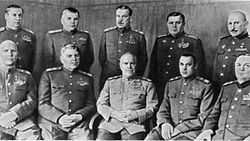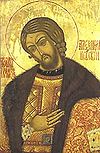- Marshal of the Soviet Union
-
Marshal of the Soviet Union (Russian: Marshal Sovietskogo Soyuza [Маршал Советского Союза]) was the de facto highest military rank of the Soviet Union. (The highest rank de jure, Generalissimus of the Soviet Union, was created for Joseph Stalin and held by him alone).
The rank of Marshal of the Soviet Union was created in 1935 and abolished in 1991. Forty-one people held the rank of Marshal of the Soviet Union. The equivalent naval rank was Admiral of the Fleet of the Soviet Union.
Contents
History of the rank
The military rank of Marshal of the Soviet Union was established by a decree of the Soviet Cabinet, the Council of People's Commissars (Sovnarkom), on September 22, 1935. On November 20, the rank was conferred on five people: People's Commissar of Defence and veteran Bolshevik Kliment Voroshilov, Chief of the General Staff of the Red Army Alexander Ilyich Yegorov, and three senior commanders, Vasily Blyukher, Semyon Budyonny, and Mikhail Tukhachevsky.
Of these, Blyukher, Tukhachevsky and Yegorov were executed during Stalin's Great Purge of 1937–38. On May 7, 1940, three new Marshals were appointed: the new People's Commissar of Defence, Semyon Timoshenko, Boris Shaposhnikov, and Grigory Kulik.
During World War II, Timoshenko and Budyonny were dismissed, and Kulik was demoted for incompetence, and the rank of Marshal of the Soviet Union was given to a number of military commanders who earned it on merit. These included Georgy Zhukov, Ivan Konev and Konstantin Rokossovsky to name a few. In 1943, Stalin himself was made a Marshal of the Soviet Union, and in 1945, he was joined by his intelligence and police chief Lavrenti Beria. These non-military Marshals were joined in 1947 by politician Nikolai Bulganin.
Two Marshals were executed in postwar purges: Kulik in 1950 and Beria in 1953, following Stalin's death. Thereafter the rank was awarded only to professional soldiers, with the exception of Leonid Brezhnev, who made himself a Marshal in 1976, and Ustinov, who was prominent in the arms industry and was appointed Defence Minister in July 1976. The last Marshal of the Soviet Union was Dmitry Yazov, appointed in 1990, who was imprisoned after the failed coup against Mikhail Gorbachev in 1991. Marshal Sergei Akhromeev committed suicide in 1991 on the fall of the Soviet Union.
The Marshals fell into three generational groups.
- Those who had gained their reputations during the Russian Civil War. These included both those who were purged in 1937–38 (Blyukher, Tukhachevsky and Yegorov), and those who held high commands in the early years of World War II (Budyonny, Kulik, Shaposhnikov, Timoshenko and Voroshilov). All of the latter except Shaposhnikov and Timoshenko proved incompetent[citation needed] and were removed from commanding positions.
- Those who made their reputations in World War II and assumed high commands in the latter part of the war. These included Zhukov, Vasilievsky, Konev, Rokossovsky, Malinovsky, Tolbukhin and Govorov.
- Those who assumed high command in the Cold War era. All of these were officers in World War II, but their higher commands were held in the Warsaw Pact or as Soviet Defence Ministers. These included Grechko, Yakubovsky, Kulikov, Ogarkov, Akhromeev, and Yazov.
All Marshals in the third category had been officers in World War II, except Brezhnev, who had been a military commissar, and Ustinov, who had been an arms factory manager. Even Yazov, who was 20 when the war ended, had been a platoon commander.
The rank was abolished with the dissolution of the Soviet Union in December 1991. It was succeeded in the new Russia by the rank of Marshal of the Russian Federation, which has been held by only one person, Marshal Igor Sergeyev, who was Russian Defence Minister from 1997 to 2001.
List of Marshals of the Soviet Union
 Photo showing the Commanders of the 10 Fronts in the spring of 1945. In the front row, Marshal of the Soviet Union I.S. Konev, A.M. Vasilevsky, G.K. Zhukov, K.K. Rokossovsky and K.A. Meretskov; back row: Marshal of the Soviet Union F.I. Tolbukhin, R.Y. Malinovsky, L.A. Govorov, Army general A.I. Yeryomenko and I.Kh. Bagramian.
Photo showing the Commanders of the 10 Fronts in the spring of 1945. In the front row, Marshal of the Soviet Union I.S. Konev, A.M. Vasilevsky, G.K. Zhukov, K.K. Rokossovsky and K.A. Meretskov; back row: Marshal of the Soviet Union F.I. Tolbukhin, R.Y. Malinovsky, L.A. Govorov, Army general A.I. Yeryomenko and I.Kh. Bagramian.
Note: All Marshals of the Soviet Union, with the exception of Non-Military Marshals had at least started their military careers in the Army. The Service Arms listed are the services they served in during their respective tenures as Marshals of the Soviet Union.
Name Lifespan Appointed Service Arm or Background Kliment Voroshilov 1881–1969 November 1935 Army/Political Mikhail Tukhachevsky 1893–1937 November 1935 Army Alexander Yegorov 1883–1939 November 1935 Army Semyon Budyonny 1883–1973 November 1935 Army Vasily Blücher 1890–1938 November 1935 Army Semyon Timoshenko 1895–1970 May 1940 Army Grigory Kulik 1890–1950 May 1940 Army Boris Shaposhnikov 1882–1945 May 1940 Army Georgy Zhukov 1896–1974 January 1943 Army Aleksandr Vasilevsky 1895–1977 February 1943 Army Joseph Stalin 1879–1953 March 1943 Political Ivan Konev 1897–1973 February 1944 Army Leonid Govorov 1897–1955 June 1944 Army Konstantin Rokossovsky [1] 1896–1968 June 1944 Army Rodion Malinovsky 1898–1967 September 1944 Army Fyodor Tolbukhin 1894–1949 September 1944 Army Kirill Meretskov 1897–1968 October 1944 Army Lavrentiy Beria 1899–1953 July 1945 NKVD/MGB Vasily Sokolovsky 1897–1968 July 1946 Army Nikolai Bulganin 1895–1975 November 1947 Political Hovhannes Bagramyan [2] 1897–1982 March 1955 Army Sergey Biryuzov 1904–1964 March 1955 Army/Air Defence/Strategic Rocket Forces Andrei Grechko 1903–1976 March 1955 Army Andrei Yeremenko 1892–1970 March 1955 Army Kirill Moskalenko 1902–1985 March 1955 Army/Strategic Rocket Forces Vasily Chuikov 1900–1982 March 1955 Army Matvei Zakharov 1898–1972 May 1959 Army Filipp Golikov 1900–1980 May 1961 Army Nikolay Krylov 1903–1972 May 1962 Army/Strategic Rocket Forces Ivan Yakubovsky 1912–1976 April 1967 Army Pavel Batitsky 1910–1984 April 1968 Air Defence Pyotr Koshevoy 1904–1976 April 1968 Army Leonid Brezhnev 1906–1982 May 1976 Political Dmitriy Ustinov 1908–1984 July 1976 Defence Industry Viktor Kulikov born 1921 January 1977 Army Nikolai Ogarkov 1917–1994 January 1977 Army Sergei Sokolov born 1911 February 1978 Army Sergei Akhromeyev 1923–1991 March 1983 Army Semyon Kurkotkin 1917–1990 March 1983 Army Vasily Petrov born 1917 March 1983 Army Dmitry Yazov born 1923 April 1990 Army - ^ As Konstanty Rokossowski he was also a Marshal of Poland from 1949
- ^ also known as Hovhannes Baghramian
See also
External links
Marshals of the Soviet Union - Voroshilov
- Tukhachevsky
- Budyonny
- Yegorov
- Blyukher
- Timoshenko
- Kulik
- Shaposhnikov
- Zhukov
- Vasilevsky
- Stalin
- Konev
- Govorov
- Rokossovsky
- Malinovsky
- Tolbukhin
- Meretskov
- Beria
- Sokolovsky
- Bulganin
- Bagramyan
- Biryuzov
- Grechko
- Yeryomenko
- Moskalenko
- Chuikov
- Zakharov
- Golikov
- Krylov
- Yakubovsky
- Batitsky
- Koshevoy
- Brezhnev
- Ustinov
- Kulikov
- Ogarkov
- Sokolov
- Akhromeyev
- Kurkotkin
- Petrov
- Yazov
People from Russia Leaders and religious - Pre-1168
- 1168–1917
- 1922–1991
- 1991–present
- RSFSR leaders
- General secretaries
- Soviet premiers (1st deputies)
- Soviet heads of state (and their spouses)
- Prime ministers (1st deputies)
- Foreign ministers
- Prosecutors general
- Metropolitans and patriarchs
- Saints

Military and explorers - Field marshals
- Soviet marshals
- Admirals
- Aviators
- Cosmonauts
Scientists and inventors - Aerospace engineers
- Astronomers and astrophysicists
- Biologists
- Chemists
- Earth scientists
- Electrical engineers
- IT developers
- Linguists and philologists
- Mathematicians
- Naval engineers
- Physicians and psychologists
- Physicists
- Weaponry makers
Artists and writers Sportspeople - Chess players
Categories:- Marshals of the Soviet Union
- Military ranks of Russia
Wikimedia Foundation. 2010.


